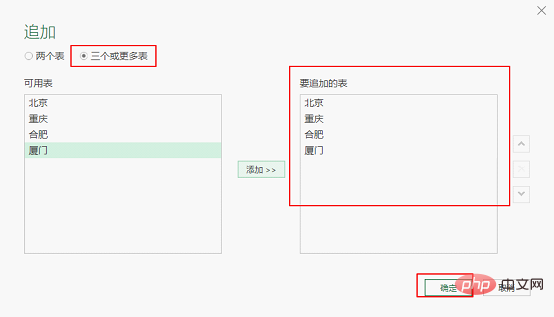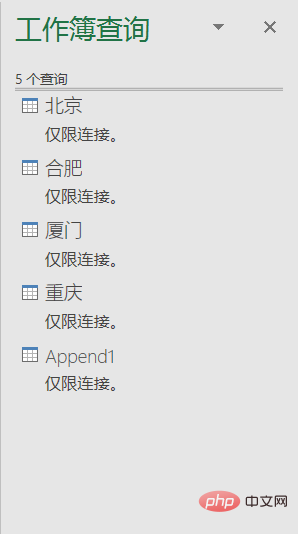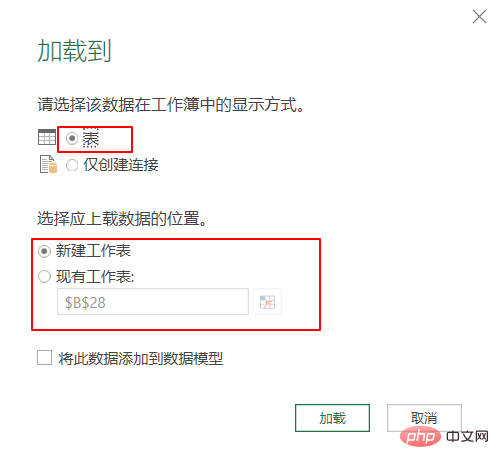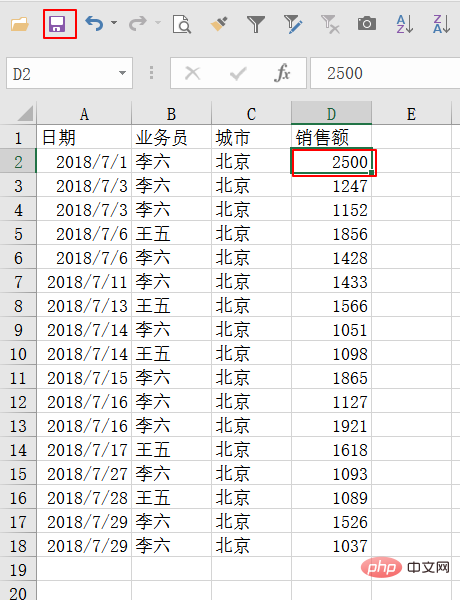Excel Case Sharing: Using Power Query to Merge Multiple Tables
In the previous article "Practical Excel Skills Sharing: Four Methods for Summing across Worksheets", we learned four methods for summing across worksheets. Today we are going to get to know the Power Query plug-in in excel. It turns out that summarizing worksheets is so convenient and fast!

At the end of each month, the Finance King will summarize the sales data from various regions across the country for data analysis. The method he used before was to copy and paste the data from each worksheet into one worksheet, and then perform pivot table analysis. But there are so many cities in the country, copying and pasting is too time-consuming, and what if the intermediate data changes? Don’t worry now. Today I will introduce to you a very useful skill in EXCEL: powerquery multi-table merging, which helps you dynamically obtain data from multiple worksheets.
1. First introduction to Power Query
As shown below, in this workbook, each worksheet lists the sales in each region of the country. Data, for the sake of example, only the basic data of four cities are listed here.

First, open the data tab, in the [Get and Transform] group, create a new query---from file---from workbook.

Power Query is originally a plug-in for EXCEL. In previous versions of EXCEL2016, it needs to be downloaded separately. However, in Excel2016, this skill has been built into the data tab [Get and Convert] group for direct use by everyone. This is enough to show the importance of Power Query. It is recommended that you upgrade to the latest EXCEL version. For versions before EXCEL2016, you can download and install the powerquery plug-in from Baidu.

Find the workbook in the pop-up window and import it.

In the pop-up navigator interface, check "Select Multiple", select all the worksheets that need to be merged, and then select "Edit" in the lower right corner .

This will enter the POWER QUERY editor interface.

This interface is the main interface for us to perform Power Query operations. You can see that the menu bar above is very similar to the EXCEL menu bar. The query window on the left displays For the four open worksheets, the query setting interface on the right is similar to PS and can record and return operations. The middle area displays the contents of the table.
2. Use Power Query to summarize data
Click on the Append Query in the [Combined] group under the Home tab.

#Select "Append query as new query" in the drop-down list.

Since there are multiple tables here, choose to append three or more tables. Add the available tables on the left to the right and click OK

We see that there is an additional query table "Append1" in the query window on the left. This table is summarized All the data in the four tables, and the middle table area displays the contents of all tables merged.

What we need to do now is to return the merged data to the worksheet. Here, select Close and Upload in the [Close] group under the Home tab, and check Select "Close and upload to".

In the "Load to" window, select "Only create a connection" and click "Load".

The worksheet query window will appear on the right side of the workbook. Shown are the five tables in the query window in the Power Query editor.

What we have to do is to display the new query table "Append1" into the table. Select "Append1", right-click and load to

Select "Table" in the "Load to" window, select "New Worksheet" for the location to upload the data, and click "Load".

The merged data will be displayed in the new worksheet. Let's rename this worksheet "Merge". The data is shown below.

3. Update data
What if the data changes?
For example, in the consolidated table just now, we can see that the total sales volume in the consolidated data is 102,281. The first piece of data, Li Liu’s sales in Beijing on July 1, 2018, is 1,780.

Now we try to modify Li Liu’s sales in Beijing on July 1, 2018 to 2500, click Save.

#Then click Refresh All in the [Connection] group under the Data tab.

We can see that the data changes immediately.
This is the most powerful thing about Power Query. Whenever you modify the data or even add data or reduce data, you can directly modify it in the data source table, then save it, and finally pass "Refresh All" synchronizes data with one click, as long as the location and name of our data source have not changed.
How about it? Is Power Query very convenient? If you like it, you can try it yourself.
Related learning recommendations: excel tutorial
The above is the detailed content of Excel Case Sharing: Using Power Query to Merge Multiple Tables. For more information, please follow other related articles on the PHP Chinese website!

Hot AI Tools

Undresser.AI Undress
AI-powered app for creating realistic nude photos

AI Clothes Remover
Online AI tool for removing clothes from photos.

Undress AI Tool
Undress images for free

Clothoff.io
AI clothes remover

Video Face Swap
Swap faces in any video effortlessly with our completely free AI face swap tool!

Hot Article

Hot Tools

Notepad++7.3.1
Easy-to-use and free code editor

SublimeText3 Chinese version
Chinese version, very easy to use

Zend Studio 13.0.1
Powerful PHP integrated development environment

Dreamweaver CS6
Visual web development tools

SublimeText3 Mac version
God-level code editing software (SublimeText3)

Hot Topics
 1389
1389
 52
52
 What should I do if the frame line disappears when printing in Excel?
Mar 21, 2024 am 09:50 AM
What should I do if the frame line disappears when printing in Excel?
Mar 21, 2024 am 09:50 AM
If when opening a file that needs to be printed, we will find that the table frame line has disappeared for some reason in the print preview. When encountering such a situation, we must deal with it in time. If this also appears in your print file If you have questions like this, then join the editor to learn the following course: What should I do if the frame line disappears when printing a table in Excel? 1. Open a file that needs to be printed, as shown in the figure below. 2. Select all required content areas, as shown in the figure below. 3. Right-click the mouse and select the "Format Cells" option, as shown in the figure below. 4. Click the “Border” option at the top of the window, as shown in the figure below. 5. Select the thin solid line pattern in the line style on the left, as shown in the figure below. 6. Select "Outer Border"
 How to filter more than 3 keywords at the same time in excel
Mar 21, 2024 pm 03:16 PM
How to filter more than 3 keywords at the same time in excel
Mar 21, 2024 pm 03:16 PM
Excel is often used to process data in daily office work, and it is often necessary to use the "filter" function. When we choose to perform "filtering" in Excel, we can only filter up to two conditions for the same column. So, do you know how to filter more than 3 keywords at the same time in Excel? Next, let me demonstrate it to you. The first method is to gradually add the conditions to the filter. If you want to filter out three qualifying details at the same time, you first need to filter out one of them step by step. At the beginning, you can first filter out employees with the surname "Wang" based on the conditions. Then click [OK], and then check [Add current selection to filter] in the filter results. The steps are as follows. Similarly, perform filtering separately again
 How to change excel table compatibility mode to normal mode
Mar 20, 2024 pm 08:01 PM
How to change excel table compatibility mode to normal mode
Mar 20, 2024 pm 08:01 PM
In our daily work and study, we copy Excel files from others, open them to add content or re-edit them, and then save them. Sometimes a compatibility check dialog box will appear, which is very troublesome. I don’t know Excel software. , can it be changed to normal mode? So below, the editor will bring you detailed steps to solve this problem, let us learn together. Finally, be sure to remember to save it. 1. Open a worksheet and display an additional compatibility mode in the name of the worksheet, as shown in the figure. 2. In this worksheet, after modifying the content and saving it, the dialog box of the compatibility checker always pops up. It is very troublesome to see this page, as shown in the figure. 3. Click the Office button, click Save As, and then
 How to type subscript in excel
Mar 20, 2024 am 11:31 AM
How to type subscript in excel
Mar 20, 2024 am 11:31 AM
eWe often use Excel to make some data tables and the like. Sometimes when entering parameter values, we need to superscript or subscript a certain number. For example, mathematical formulas are often used. So how do you type the subscript in Excel? ?Let’s take a look at the detailed steps: 1. Superscript method: 1. First, enter a3 (3 is superscript) in Excel. 2. Select the number "3", right-click and select "Format Cells". 3. Click "Superscript" and then "OK". 4. Look, the effect is like this. 2. Subscript method: 1. Similar to the superscript setting method, enter "ln310" (3 is the subscript) in the cell, select the number "3", right-click and select "Format Cells". 2. Check "Subscript" and click "OK"
 How to use the iif function in excel
Mar 20, 2024 pm 06:10 PM
How to use the iif function in excel
Mar 20, 2024 pm 06:10 PM
Most users use Excel to process table data. In fact, Excel also has a VBA program. Apart from experts, not many users have used this function. The iif function is often used when writing in VBA. It is actually the same as if The functions of the functions are similar. Let me introduce to you the usage of the iif function. There are iif functions in SQL statements and VBA code in Excel. The iif function is similar to the IF function in the excel worksheet. It performs true and false value judgment and returns different results based on the logically calculated true and false values. IF function usage is (condition, yes, no). IF statement and IIF function in VBA. The former IF statement is a control statement that can execute different statements according to conditions. The latter
 How to set superscript in excel
Mar 20, 2024 pm 04:30 PM
How to set superscript in excel
Mar 20, 2024 pm 04:30 PM
When processing data, sometimes we encounter data that contains various symbols such as multiples, temperatures, etc. Do you know how to set superscripts in Excel? When we use Excel to process data, if we do not set superscripts, it will make it more troublesome to enter a lot of our data. Today, the editor will bring you the specific setting method of excel superscript. 1. First, let us open the Microsoft Office Excel document on the desktop and select the text that needs to be modified into superscript, as shown in the figure. 2. Then, right-click and select the "Format Cells" option in the menu that appears after clicking, as shown in the figure. 3. Next, in the “Format Cells” dialog box that pops up automatically
 Where to set excel reading mode
Mar 21, 2024 am 08:40 AM
Where to set excel reading mode
Mar 21, 2024 am 08:40 AM
In the study of software, we are accustomed to using excel, not only because it is convenient, but also because it can meet a variety of formats needed in actual work, and excel is very flexible to use, and there is a mode that is convenient for reading. Today I brought For everyone: where to set the excel reading mode. 1. Turn on the computer, then open the Excel application and find the target data. 2. There are two ways to set the reading mode in Excel. The first one: In Excel, there are a large number of convenient processing methods distributed in the Excel layout. In the lower right corner of Excel, there is a shortcut to set the reading mode. Find the pattern of the cross mark and click it to enter the reading mode. There is a small three-dimensional mark on the right side of the cross mark.
 How to insert excel icons into PPT slides
Mar 26, 2024 pm 05:40 PM
How to insert excel icons into PPT slides
Mar 26, 2024 pm 05:40 PM
1. Open the PPT and turn the page to the page where you need to insert the excel icon. Click the Insert tab. 2. Click [Object]. 3. The following dialog box will pop up. 4. Click [Create from file] and click [Browse]. 5. Select the excel table to be inserted. 6. Click OK and the following page will pop up. 7. Check [Show as icon]. 8. Click OK.





